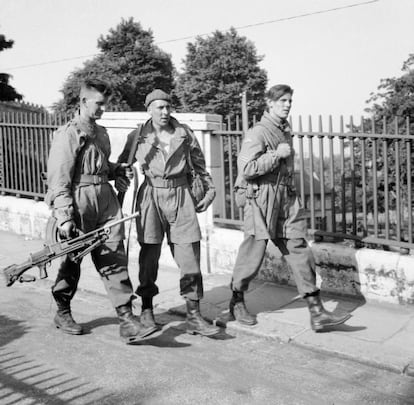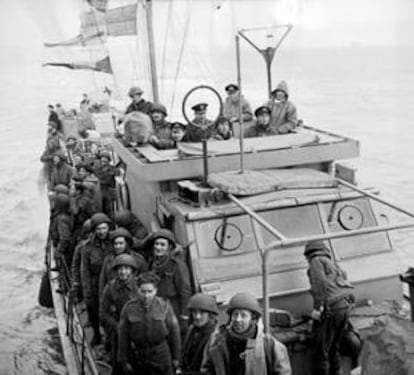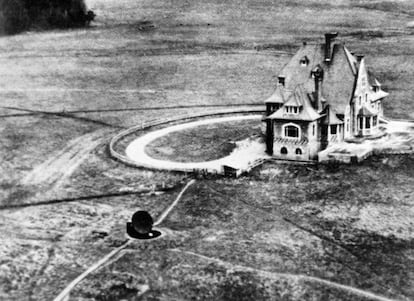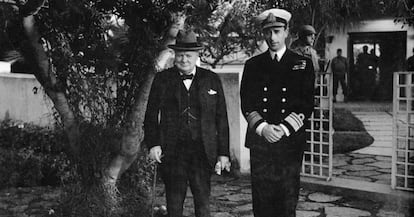How to steal a radar from Hitler with 100 paratroopers and a lot of luck
In ‘Operation Biting,’ Max Hastings narrates a daring action by British special forces that could have come from the pen of Alistair MacLean, the author of ‘Where Eagles Dare’


Things weren’t going well. The Germans were advancing on all fronts, and Britain — stubbornly hunkered down on its island and behind its fleet — could do nothing but wait for the tide of the war to turn, which was bound to happen eventually. Meanwhile, a window of opportunity opened to give the nation a sense that something, something courageous, was being done.
Reconnaissance flights over the French Channel coast discovered a Nazi radar installation in occupied France, on a cliff near the small fishing village of Bruneval. It was identified as an advanced Würzburg device (from the Telefunken company, always a guarantee), part of the vital German detection network for British fighters and bombers. The idea arose of a daring special forces mission to capture this radar from Hitler and reveal its advanced technology, thereby humiliating the enemy.
Operation Biting — which consisted of sending a handful of engineers on the night of February 27-28, 1942, to dismantle and transport the radar, and 100 paratroopers from C Company of 1st Airbourne Division to provide cover and confront the German defenses, plus naval support to collect them all — is part of the small print of World War II, but it’s still a sensational adventure.
And if the historian Max Hastings is telling the story, the result is thrilling. The 300 pages of Operation Biting read, and the well-worn simile is worth it, like a novel. Not like just any novel, but one of those electrifying novels by Alistair MacLean, such as Where Eagles Dare or The Guns of Navarone (which gave rise to excellent big-screen adaptations, something that Biting undoubtedly deserves). “Yes, it’s true, it’s a wonderful story, definitely very Alistair MacLean-esque!” Hastings agrees in a video interview. “It’s not a big operation but it turned out extraordinarily well, with a happy ending, for the British.”

Hastings, 79, explains in detail the preparations for the operation and the description of the culminating action is masterful, full of excitement, shock, and gunfire. But what he seems to enjoy most is describing the characters, such as the brilliant scientist Reginald V. Jones, “Reg;” Commodore Lord Louis “Dickie” Mounbatten, then head of Combined Operations; “Churchill’s pirates,” the commandos; Frederick “Boy” Browning, the commander of the fledgling paratrooper force that had not yet adopted the iconic red beret (and who was married to the writer Daphne du Maurier, a relationship to which Hastings pays considerable attention); or Gilbert Renault, “Colonel Rémy,” leader of the French Resistance and, according to the author’s description, completely unsuited to the task.
“Whenever I plan to write a book, I think, ‘What can I tell my readers that they don’t already know?’ Although very small, Operation Biting is full of great characters, and I love writing about them. And then there are the special forces. And Churchill’s need to show that the British were still fighting the war vigorously, even though not much was happening and there was still a campaign on the continent. You have to remember that between 1940 and 1944, despite North Africa and Burma, half the British army remained on English soil, waiting to return to France.” If major victories weren’t immediately available, Churchill told himself, small triumphs would have to do.
The historian laughs when told that he increasingly sounds like a mixture of Thucydides and Jane Austen. “You’re very kind, too kind. I’m a storyteller. Before, I wrote big ones — Vietnam, Korea, the First World War, major campaigns of the Second [World War] — but increasingly, it’s people that interest me primarily, less strategy and more human behavior. Even if they’re stories set in the Second World War, I write about things that happen to people.”
With Mountbatten, he’s a real jack-of-all-trades (“an extreme narcissist [...] there was a certain intelligence in him, although marred by a childish vanity”). Here we’re in the realm of Noël Coward rather than Alistair MacLean. “One of the things that fascinates me about Mountbatten is that curious combination of being a military leader and always on the verge of ridicule: he had colossal vanity and an obsession with uniforms and medals. As a leader, he left much to be desired — he was later responsible for the Dieppe disaster — but he was enthusiastic, handsome, a cousin of the King, George VI, and a friend of Churchill. Professional military personnel couldn’t understand why Churchill would promote him, but in those dreary times, Mountbatten’s undeniable glamour was a point: he inspired hope and confidence in people.”
Hastings even delves into Mountbatten’s sexuality and his relationship with his wife, Edwina, with an amused enthusiasm more in keeping, one might say, with Lady Whistledon than Basil Liddell-Hart. The fact that Mountbatten was later killed by the IRA was deeply shocking; you almost feel as if Jack Ryan wasn’t there to save him. “He was a prominent figure, and easy prey. He had a castle on the west coast of Ireland, and they were able to get to him there. I met him, and as a journalist, I reported on his funeral — an extraordinary event, he would have loved it. His only disappointment would probably have been not being able to attend.”

Operation Biting went very well. “It was a huge success, but that night the British had all the luck and the Germans didn’t. Some of the paratroopers, under the command of the solid Major John Frost, played by Anthony Hopkins in A Bridge Too Far in the subsequent Battle of Arnhem, were dropped poorly by the RAF and either didn’t take part in the action or arrived late. When they withdrew, after stirring up the hornets’ nest, the attackers had to wait a long time, 45 minutes, on the beach for the boats to come and pick them up. If the Germans had been well-positioned or had counterattacked, it would have been a disaster for the British. The German troops were slow and clumsy. The British got the impression that they would always behave like that, which later caused them more than a little disappointment.”
There are small-scale parallels with D-Day (Hastings’s new book, Sword: D-Day Trial by Battle, is dedicated specifically to the actions on Sword Beach). “Yes, there was luck there too. If Rommel had been in France, the Germans would have moved faster.”

Curiously, the Luftwaffe officer who commanded the Bruneval radar installations (which included Freya and Würtzburg models, and a brothel in nearby Étretat) was Prince Alexander-Ferdinand von Preussen, great-great-grandson of Queen Victoria and a cousin of Mountbatten (originally Battenberg), who was enjoying a rather cushy posting in France (Hastings takes the opportunity to recall that the German veterans he has interviewed always told him that in occupied France they “lived like gods”). Von Preussen was AWOL at the start of the attack.
While the paratroopers (there were no gliders at Biting, still a force in its embryonic state at the time) established a security cordon and took key German positions by fire, the engineers hastily dismantled the radar, with its dish (“the big mussel”) and its equipment, and finally everyone fled, taking a couple of Nazi technicians captive in the process. It was a very bloodless operation (two British and five German dead).
“I was impressed by the statistics, because there was so much shooting, so much. It’s surprising how many bullets it takes to kill someone.” During the Normandy landings, Hastings notes, the greatest number of casualties were caused by mortar fire, but at Bruneval the Germans didn’t have any. However, during the operation, there were many machine guns (the worst for the British, curiously, was a French model fired by the Germans). “I was a correspondent in the Falklands, and I remember one night when there was so much shooting that I thought everyone would be dead the next morning, and yet there were few casualties.” Is it due to poor aim? “In wars, many soldiers shoot without even aiming. If you look at Ukraine, for example, soldiers are killed by bombs or drones, not by gunfire.”
Hastings recalls in the book that he himself was a paratrooper, which makes it particularly pertinent to talk about Operation Biting. “My experience is that paratroop operations are often an uncertain adventure, if not a disaster, especially at night. In 1963, at the age of 17, I took part in a drop in Cyprus. We were much better equipped than Biting’s paratroopers, even with Mae West [life jackets] and position lights, but the whole battalion was scattered. I thought, ‘If this is how it works in peacetime, what will it be like in war?’ Paratroopers can be very glamorous, but they’re not very effective.”
Well, it takes a lot of courage to jump (although Hastings does mention the case of the courageous soldier who, upon doing it for the first time, exclaimed, “Wow! This is better than sex!”). “It was especially risky during the Biting era, when the British didn’t carry reserve parachutes like paratroopers in other countries. It certainly took a lot of courage to jump at night into Nazi-occupied France, and in the snow. I have a lot of admiration for those men who also fought when things were going badly and it seemed like nothing would stop the Nazis. As the popular saying goes: ‘If you want to have a happy war, go into action when your side is winning.’”

While we’re at it, what makes people fight? “In the 20th century, many people were conditioned by military life in a way we can’t imagine in the 21st century. The same generation had already lived through another war. And there was a sense of pride in the military tradition. In family albums, you’d see your parents and grandparents in uniform. On the other hand, in wars, there are a limited number of people who want adventure, and they should be avoided; but most just want to come home alive.”
Given the success with the radar, why didn’t the airborne forces attack the V-1 and V-2 installations later? “The rockets were farther away and harder to locate. Bruneval was only 80 miles across the Channel.” An assessment of Biting? “Analyzing the captured German radar gave the British a two or three-month head start, so it was useful in that sense, but the real success was its propaganda output. The attack was framed as a victory over the Germans at a time when there were so many military humiliations on the table.”
Operation Biting is a phenomenal opportunity to meet the best Hastings, the one who creates those wonderful portraits, who explains how the first Sten machine guns, the iconic weapon of commandos and paratroopers, were manufactured in the same Liverpool factory as Meccano; who describes how the first thing the British paratroopers did when they set foot in Hitler-occupied France was to urinate (a gesture not only symbolic but necessary due to their bladders being full from the journey, fear, and too much tea); or who recounts he wouldn’t let his son wear his old airborne smock to a fancy dress party. “He asked me why not, since I obviously wasn’t going to wear it again, and I told him it didn’t matter.”
What does Hastings think of Israel’s attack on Iran? “Terrifying, it’s impossible to imagine an end to this. I know Netanyahu [he wrote the biography of his older brother, Yoni, the hero of the Entebbe rescue]. He’s a crazy leader who terrifies me. I’ve always thought he’s evil. Like Putin and Trump, he doesn’t care about the future of humanity. His goals have always been to stay in power, create a greater Israel with the West Bank and Gaza, and drag the U.S. into a war with Iran. A dozen years ago, the smartest man I’ve ever met, the historian Michael Howard, told me: ‘If there’s one thing that drives Iran to nuclear weapons, it’s the West’s determination to keep it from having them.’” On the other hand, it’s very dangerous for Israel to base its entire policy on the assumption of its military superiority. They assume it will always be this way and prefer to live in a permanent state of war rather than make concessions to peace." Hastings continues: “It’s a tragedy, but some of us who admired the Israeli army, I fear, now see its terrible ugliness. Trump empowers them.”
The historian doesn’t believe Iran can be defeated, and the reason for the Israeli attack — the destruction of nuclear facilities — raises doubts: “According to experts, a good part of these facilities are safely underground and could only be destroyed with MOAB penetrator bombs, just one level below atomic weapons, and which only the U.S. possesses.” Regarding the attacks on Iran, Hastings recalls French president Nicolas Sarkozy’s comment during the coalition attack on Tripoli in 2011: “I could help to destroy Gaddafi, but not to irritate him.”
Sign up for our weekly newsletter to get more English-language news coverage from EL PAÍS USA Edition
Tu suscripción se está usando en otro dispositivo
¿Quieres añadir otro usuario a tu suscripción?
Si continúas leyendo en este dispositivo, no se podrá leer en el otro.
FlechaTu suscripción se está usando en otro dispositivo y solo puedes acceder a EL PAÍS desde un dispositivo a la vez.
Si quieres compartir tu cuenta, cambia tu suscripción a la modalidad Premium, así podrás añadir otro usuario. Cada uno accederá con su propia cuenta de email, lo que os permitirá personalizar vuestra experiencia en EL PAÍS.
¿Tienes una suscripción de empresa? Accede aquí para contratar más cuentas.
En el caso de no saber quién está usando tu cuenta, te recomendamos cambiar tu contraseña aquí.
Si decides continuar compartiendo tu cuenta, este mensaje se mostrará en tu dispositivo y en el de la otra persona que está usando tu cuenta de forma indefinida, afectando a tu experiencia de lectura. Puedes consultar aquí los términos y condiciones de la suscripción digital.








































